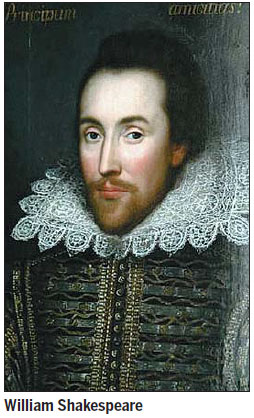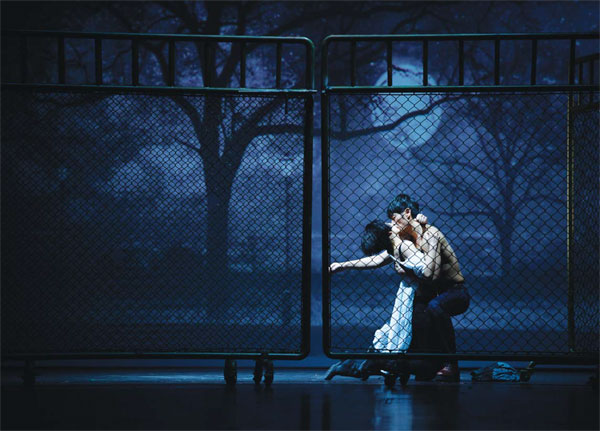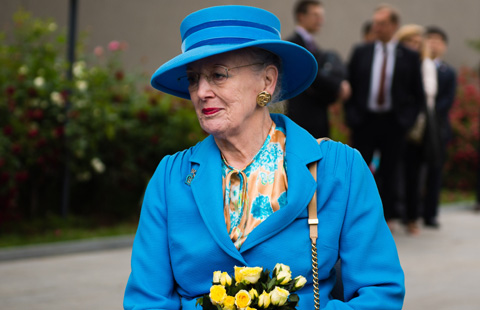All China's a stage
Updated: 2014-05-02 07:50
By Raymond Zhou (China Daily Europe)
|
|||||||||||
|
Tian Qinxin's staging of Romeo and Juliet keeps the fire burning between the star-crossed lovers. Chai Meilin / For China Daily |
William Shakespeare's work has graced the Chinese stage for more than a century now, but the enormous breadth of his work has dazzled rather than enlightened when it's transplanted ... until now
William Shakespeare was placed on a pedestal when his name first appeared in Chinese publications around 1839. Great scholars and artists have since made numerous attempts to bring the "Swan of Avon" to a Chinese-speaking audience. Although statistics are hard to come by, it's almost certain that he is the most translated foreign author and the most staged foreign dramatist.
Shakespeare (1564-1616) who was born and died on the same date, April 23 now the UNESCO-anointed World Book Day has been an inspiration for several generations of Chinese readers and theatergoers. (Spain's Miguel de Cervantes died on the same day April 23, 1616; and Tang Xianzu, arguably China's greatest dramatist and author of The Peony Pavilion, died in the same year.)
While the Chinese only spotlight about a dozen of Shakespeare's plays, academic research tends to have a much wider focus. Most of the approaches are oriented toward discovering the social context of his works and recreating them, in text and on the stage, as close to the original as possible. Productions place great emphasis on replicating the "foreignness" of the characters and sets, and translators spend more time trying to figure out how to render the poetic forms, rather than the rich layers of meaning.
In the past two decades, Chinese dramatists have experimented with increasingly liberal treatments of the Bard's plays and texts. The eminent Chinese theater director Lin Zhaohua has said he "does not serve Shakespeare" when he takes on one of his plays. "I use my heart and soul to approach his text, but ultimately it is for myself," he says. "I express what I feel about our world through the dramatic characters and situations in his plays, the parts that speak to me. It doesn't matter whether it's a comedy or a tragedy. The audience can interpret it in their own way."
Stan Lai, who usually writes his own plays but has directed Western classics such as Shakespeare, believes that Chinese idolatry of the Bard has essentially turned him into a brand. "Don't obsess over the plots," he suggests. "We should explore the spirit of his work. And don't forget, Shakespeare was an entertainer of mass appeal in his day."
Still cutting edge
As Tian Qinxin put it, because Shakespeare belongs to the world, there is no need to subvert him. "All you need is to understand and express him with Chinese situations." Tian, who has just produced her own version of Romeo and Juliet, doesn't equate respect and homage of a classic with the reproduction of the exact language or imitating the movements of Western actors.
To be what she calls "a translating machine" for the emotions Shakespeare conveys, Tian has to overcome her own religious restraints: "I'm a Buddhist, and I believe love is about possessing and controlling and fear of loss. So, I have to approach the story from the point of view of a nonbeliever."
And that, according to many in the audience, has helped her to capture the essence of Romeo and Juliet, which is young love in all-consuming blossom.

The same play was definitely subverted when Meng Jinghui, China's pre-eminent avant-garde impresario, took a stab at it in 2011. "We want to show the cutting edge of today's youth. Shakespeare was cutting edge in his time. He was forward-looking and very much the embodiment of the zeitgeist 400 years ago. I want to have a dialogue with him," says Meng, who watched 24 different productions of the play and incorporated a plethora of styles in his own, including pop, gothic, heavy metal, vampirism and collage. "That is my brand new interpretation," he says.
Like China's own Yuan Dynasty (1271-1368) dramas, Shakespeare was grounded in the grassroots, according to Yang Zao, a Beijing-based literary researcher. "If we present only the so-called faithful versions, they would attract a very limited audience. The West has taken great strides in breathing new life into these classics, and we should know how to learn from them and explore what is eternal in his work. Shakespeare is a cultural resource we should both respect and explore."
As more dramatizations flow into China through touring and filmed performances, the implicit notion that there must be one authentic version is giving way to a diverse range of interpretations. This has unchained the preconceptions of the Bard from the clutches of academics and made him accessible to the general public, which holds him in awe. People are discovering parts of his work with strong resonance and then trying to paraphrase it in their own languages and situations. Contemporary dilemmas are conjured up as perfect parallels to what's in the text.
To a growing number of Chinese, Shakespeare has morphed from a literary icon to whom one has to show sufficient respect to prove one's educational credentials, to a writer whose prescience and insight into the human condition have illuminated our own era of dizzying change.
Early productions
The first production of Shakespeare in China was staged in 1902, when, in an effort to better understand English history and language, students at Shanghai St. John College put on The Merchant of Venice in the original language.
The story of Antonio, Portia and Shylock also produced the most popular Chinese-language dramatizations in the early years of the 20th century, when some 20 plays saw the light of day in the Middle Kingdom. But they were Shakespearean stories, based on the Lamb's version, rather than Shakespeare's own plays. Very often, actors were only given the plot, but no dialogue. They were supposed to improvise. So, "Hath not a Jew eyes?" or "The quality of mercy" might well have never been heard on a Chinese stage at the time.
The emphasis on narrative had an unintended benefit: It often brought out the contemporary relevance of the stories and helped strike a chord with the audiences of the day. A 1916 production of Macbeth, re-titled The Usurper, was a not-so-subtle swipe at the President-turned-Emperor Yuan Shikai. The actor Gu Wuwei was arrested on the grounds of inciting unrest and rebellion and was sentenced to death. But a happy ending came for the actor in a perfect deus ex machina when Yuan died suddenly and his regime fell.
The first professional Chinese production based on Shakespeare's own text, albeit in translation, took place in 1930. Again, it was The Merchant of Venice. Painted backdrops depicted Italian scenes and the actors wore Western costume. According to the scholars Ruru Li and David Jiang, as of 1994, about 95 percent of Shakespearean productions in China adhere to this style, which was considered authentic.
Different realities
The spoken play, as we know it, is an import from the West. Shakespeare's appearance on the Chinese stage coincided with the introduction of this new art form. As this modern, Western form of theater searched for maturity in urban China, traditional Chinese theater, made up of hundreds of dialect-based operas, took to Shakespearean material almost without a glitch. The larger-than-life characters, the long monologues and the dramatic twists all found a perfect home in China's existing theatrical traditions. As a matter of fact, Hamlet was turned into a Sichuan Opera piece long before the first "authentic" translated play was presented.
The Chinese reincarnations are often cited as testimony of the Bard's penetration into a different culture. But the reality may be different. Very often, adapting Shakespeare (and other Western sources) is a means of attracting a younger audience. The Taiwan-based actor Hsing-kuo Wu was blunt when he transformed Macbeth into The Kingdom of Desire, a Peking Opera: "By using a foreign play, the company would have a somewhat-neutral text on which it could write its own prescription for the future."
The implicit problem with this approach is over-simplification of the characters. Because Chinese operas are essentially morality dramas with black-and-white portrayals, the adaptors have to sacrifice Shakespeare's richness in portrayal and opt for a cut-and-dried interpretation. When a Shanghai-based opera troupe was commissioned to re-imagine a production of Hamlet in 2005, for the Danish castle where the original story is set, everything had to be trimmed from the original text, and only the element of revenge was preserved. "Hamlet is very complicated, and mine is like an elementary student's version," admitted Feng Gang, the playwright who adapted the story.
Not only are the stories transplanted to China and the names Sinicized, but sometimes even the ending is changed as a mark of respect for the conventions of the particular theatrical form taking on the Bard. A 1994 Yueju opera version of Hamlet dispensed with the tragedy and had the Danish prince rescue his country from his corrupt uncle. Yueju appeals mostly to housewives, so a stage littered with dead bodies was simply out of the question.
In the past two decades an experimental approach has been used a hybrid of the "authentic" style and total localization. It's interesting to note that all such efforts are in the realm of theater, not opera. Tian Qinxin's new Romeo and Juliet, playing in various Chinese cities throughout 2014, retains key passages from the original text, but all the transitional scenes have been rewritten in the Beijing dialect. One moment Romeo is swearing like a kid from the hutong, or alley, the next he blurts out lines that only those in a sublime state could utter. This juxtaposition may puzzle some members of the audience, but if you treat the original texts as singing it begins to make sense. The setting seems to be a dreamscape that incorporates both Beijing and Verona.
Tian also transposed King Lear to the Ming Dynasty (1368-1644) because "the story fits any time, any place, as long as you capture its essence," according to Li Dong, the producer. Instead of a Shakespearean scholar, the writer of a popular historical novel set during the dynasty was hired to write the adaptation inspired by King Lear.
Subversion and soliloquies
Of all Chinese stage directors, Lin Zhaohua may be the most brilliantly subversive in staging Shakespeare. He doesn't change the text, but he never stops searching for new ways to bring out what he perceives to be new discoveries from the hoary classics. His production of Richard III toned down the royal atmosphere and played the intrigue and conspiracy like a game. His message: backstabbing happens everywhere.
Lin's Hamlet, periodically revived since its 1990 debut, is a psychological drama in which the protagonist must face his own weaknesses as well as the fickleness of fate. As Pu Cunxin, who has essayed most of the leading roles in Lin's productions of Shakespeare, realized, "There is no Danish prince, and I don't have to imitate movements foreign to me. It's just me the feeble, hopeless, self-torturing intellectual. I learned to channel my own questions and interpretations into the play and find release and communication in the world of Shakespeare."
Lin's visualization of the most famous soliloquy in English theater "To be or not to be" has three actors speaking the lines together, facing each other, but off by a beat or two, thus creating an effect that the character is struggling with various aspects of himself. If a soliloquy is a solo aria, this one is now a trio.
This year, Lin's much acclaimed Coriolanus premiered in 2007 and with a side stop in Edinburgh will be revived as part of a strong lineup that the National Center for the Performing Arts has designed to celebrate the 450th anniversary of Shakespeare's birth. The celebration also includes Dunsinane by the National Theater of Scotland and Royal Shakespeare Company, a sequel to the Macbeth story, A Midsummer Night's Dream directed by Tim Robbins, a Romeo and Juliet that uses mostly body language, and Verdi's operatic rendition of Othello, among the other offerings.
This may well be China's busiest Shakespeare year at least for a single venue since the first Shakespeare Festival was held in April 1986, when 25 plays were staged in Beijing and Shanghai. But then, Shakespeare has never been out of vogue in the Middle Kingdom. In 1949 alone, the year New China was founded, as many as 13 of his plays were presented across the country.
raymondzhou@chinadaily.com.cn
(China Daily European Weekly 05/02/2014 page24)
Today's Top News
EU: No armed intervention in Ukraine
Chinese premier visits Nigeria
Court to rule on Yingluck in Thailand
Travellers to Malaysia drop
Chinese to US grad schools drop
Ukraine moves special forces to Odessa
Slovenian PM resigns
Disclosure of military secrets becoming bigger risk
Hot Topics
Lunar probe , China growth forecasts, Emission rules get tougher, China seen through 'colored lens', International board,
Editor's Picks

|

|

|

|

|

|






